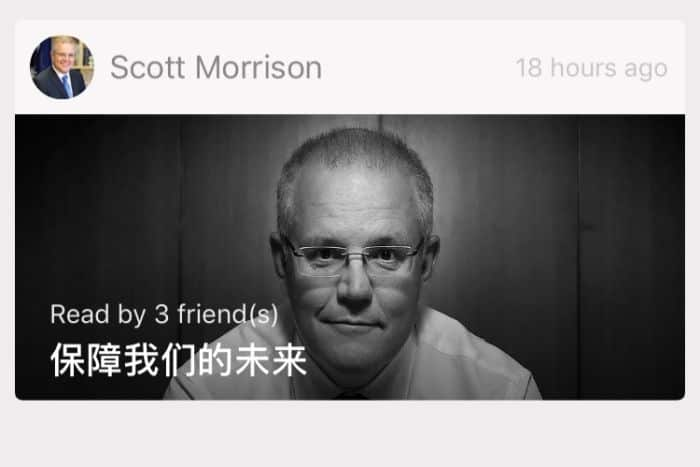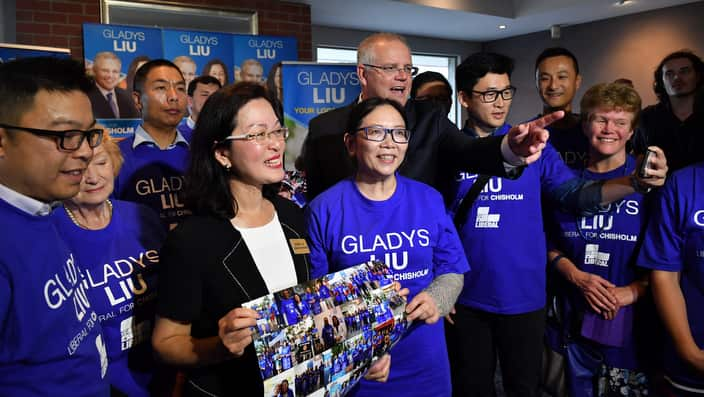It is estimated that more than 2 million Australians own the Chinese multi-purpose messaging app WeChat.
For the majority of the Chinese diaspora in Australia, it is one of the most efficient ways to access information and daily news.
It is also a key tool in Australia's current political landscape.
Prime Minister Scott Morrison joined WeChat ahead of Chinese New Year celebrations in February and wrote a post in Chinese, saying he hoped to "establish closer channels of communication with Chinese-Australians" through the platform.
A month later, Mr Morrison delivered a message in Chinese on the platform to introduce the Parent Visa 870, a visa which is believed to affect new migrants from China.

Labor leader Bill Shorten, who joined the network in 2017, even participated in a WeChat live discussion session on March 27 with 500 online participants.
Other Labor politicians are also active on the platform, including Shadow Treasurer Chris Bowen and Shadow Minister for Environment and Water Tony Burke, as well as former Prime Minister Kevin Rudd.

Concern of censorship
It is widely understood that social media in China is moderated by the country’s communist government, and WeChat is no exception, according to public ethics expert Professor Clive Hamilton.
The author of the controversial book Silent Invasion, warns that Australian politicians using Wechat “need to understand that their communications are being monitored and, if necessary, censored by Beijing's army of censors”.
Prof Hamilton, who was a former federal candidate for the Greens, said that he also feared that Australian politicians would censor themselves to avoid the official censors.
“Some Chinese-Australians critical of the Chinese Communist Party have been banned from WeChat by Beijing's censors or had the messages blocked,” he said.

In 2018, Australia's Department of Defence banned its officials from using WeChat.
Although the department did not confirm the reason for the decision, Prof Hamilton believes the app posed “significant security concerns” for Australia.
“WeChat accounts cannot be encrypted, making them easier to use to hack into other accounts. If defence personnel are banned from using WeChat then there is a case for politicians to also be excluded, or at least to take extra security measures.”
‘A platform for interaction’
The battle to win the hearts and minds of Chinese-Australian voters heated up before the NSW election when then state Labor leader Michael Daley said young people were being forced to "flee" Sydney because their jobs were being taken by educated Asian migrants.
The comments were widely criticised and led to an apology from Mr Daley.
Liberal candidate in the seat of Kogarah, Scott Yung, said his objection to Mr Daley's comments on WeChat resonated with voters in his electorate.
Mr Yung narrowly missed out on winning the Sydney seat to Labor's sitting member Chris Minns, but he saw a massive 8.4 per cent swing in his favour.

He said the result was largely due to his team’s strategy on the social platform.
Mr Yung said he utilised WeChat to inform his constituents that he is a successfully integrated Chinese-Australian.
“Our central component was a positive message of what it means to be a migrant Australian. How my story resonates with many migrant Australians.”
More Chinese-Australian politicians are using the platform ahead of the federal election.
Liberal candidate Gladys Liu and Labor candidate Jennifer Yang are campaigning heavily on WeChat for the federal seat of Chisholm in Victoria.

Ms Liu said: “WeChat has deepened the understanding of Australian politics for the Chinese community. It also helps the politicians to pay more attention to the Chinese community’s demands and to gain their support.”
Ms Yang said Mr Shorten’s initiating of his WeChat account in 2017 allowed for the community to understand the policies and receive much-needed information.
Ms Yang said WeChat is a “platform for interaction” and can also be a thermometer for the party to gauge the sentiment and ideas from within the community.
'Just another platform'
The politicians who are active on WeChat said they feel no threats of foreign interference.
Ms Liu said she has been using WeChat for five years.
“I almost post different information every day. So far I have never been interfered and revived any pressure.”
“The information on our WeChat is public. It aligns with our public information on the website.”
Ms Yang said WeChat works just like other social media sites in disseminating information, a sentiment shared by Mr Yung.
“WeChat is like any other social media platforms, it’s like Facebook, like Twitter, like Instagram,” he said.
“It’s just another platform except the audience is large of Chinese-Australian background.”
Media expert Wanning Sun urged Australian politicians to develop specific WeChat strategy and pointed out that those WeChat accounts “are maintained by Chinese-speaking proxies, which does little more than increase their visibility".
Meanwhile, Prof Hamilton suggests politicians explore new ways to communicate with the Chinese community.
“Australian politicians need to develop their own means of communicating directly with voters of Chinese heritage rather than relying on media controlled by Beijing.”
